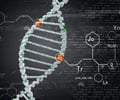- Preconception exercises are usually done to increase the chances of conceiving.
- Dad’s preconception exercises are found to increase the risk of obesity and insulin resistance in the offspring gene.
- The study is found to help in the future treatment of metabolic disorders.
Alexander Murashov lead author and associate professor of physiology at East Carolina University said that fathers’ exercise regimen programmed the offspring to be able to burn calories more efficiently, “like [an] energy efficient car which uses less gas to run the same distance.”
The study findings found that paternal sperms were capable of changing the miRNA and metabolic genes in the offsprings.
The research team also found that the effect “may be an adaptive mechanism of changing offspring phenotypic features in response to environmental challenges experienced by fathers.”
Murashov said that the results were “a total surprise, because our initial hypothesis was that paternal long-term exercise would decrease risk for obesity in the offspring.”
The outcome of the study will also help in the future treatment of metabolic disorders in humans.














